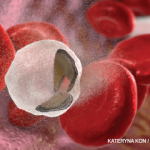 Complex, but common
Complex, but common
Editor’s note: ACR on Air, the official podcast of the ACR, dives into topics important to the rheumatology community. Here we highlight episode 86, “Insights into Inborn Errors of Immunity,” which featured an interview with Dr. Bharat Kumar, physician editor of The Rheumatologist and aired on Sept. 24, 2024.
Rheumatologists often treat patients with complex systemic symptoms that can be hard to diagnose. Inborn errors of immunity are a differential diagnosis; these may present with autoimmunity, autoinflammatory issues and immunodeficiency, all mimicking rheumatic diseases.
Bharat Kumar, MD, ME, FACP, RhMSUS, clinical associate professor of medicine for allergy/immunology and rheumatology at the University of Iowa, Iowa City, and physician editor of The Rheumatologist, joined ACR on Air to provide insights into inborn errors of immunity.
Dr. Kumar noted that rheumatologists should remain vigilant about inborn errors of immunity because they see them so often. “Whether or not we actually recognize it or actually decide to call them inborn errors of immunity is a different question, but we do see them all the time,” he said.
A Terminology Debate

Dr. Kumar
One reason inborn errors of immunity can get complex is because the terminology used to define them continues to evolve, Dr. Kumar said. He cited the 2019 consensus definition: “The inborn errors of immunity, also referred to as primary immune deficiencies, manifest as increased susceptibility to infection, disease, autoimmunity, autoinflammatory disease, allergy and/or malignancy.”1 However, he noted, this definition does not offer much to indicate what these conditions are.
The terminology also can be misleading because not all of these inborn errors of immunity are present at birth. They can present later in life. Plus, a person can have an inborn error of immunity, but if they’re raised in a totally sterile environment, it may never manifest.
Dr. Kumar also does not like the use of the word error in the terminology. “Many of the things we’ve considered errors in the past have turned out to be natural human variation, or it’s turned out that they’re actually beneficial for whatever reason,” he said.
Even the term primary immune deficiency is not as precise as it could be, Dr. Kumar added.
Despite any misgivings about the terminology, Dr. Kumar believes that an awareness of inborn errors of immunity is important. “We’re learning the immune system is intimately involved in virtually every single physiological process, and that’s why rheumatologists should be aware of what inborn errors of immunity are,” he said.



